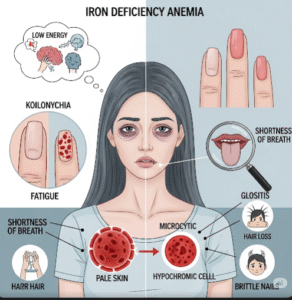Overview
Felty’s syndrome is a rare autoimmune disorder characterized by the triad of rheumatoid arthritis (RA), an enlarged spleen (splenomegaly), and low white blood cell count (neutropenia). This condition is uncommon worldwide but is recognized in Korea, particularly in patients with long-standing rheumatoid arthritis. Early detection and management are crucial to reduce infection risk and maintain quality of life.
What is Felty’s Syndrome?
Felty’s syndrome is considered a severe extra-articular manifestation of rheumatoid arthritis. Patients with long-term RA may develop this syndrome, which increases their susceptibility to recurrent infections due to low white blood cells.
Symptoms
- Chronic joint pain and swelling (typical of RA)
- Recurrent infections (respiratory, skin, urinary tract)
- Enlarged spleen causing fullness or discomfort in the upper left abdomen
- Fatigue and malaise
- Anemia-related symptoms (weakness, pale skin)
- Weight loss in advanced cases
Causes
- Long-standing, severe rheumatoid arthritis
- Autoimmune response leading to destruction of white blood cells
- Genetic predisposition (rare)
Risk Factors
- Patients with rheumatoid arthritis (especially severe, uncontrolled RA)
- Middle-aged and older adults
- Female patients are more frequently affected
- Long disease duration (RA lasting more than 10 years)
Complications
- Life-threatening infections due to neutropenia
- Increased risk of lymphoma in some patients
- Splenic rupture (rare but possible due to splenomegaly)
- Worsening joint damage and disability
Prevention
- Effective management of rheumatoid arthritis
- Regular blood tests to monitor white blood cell counts
- Prompt treatment of infections
- Vaccinations (influenza, pneumococcal) to prevent common infections
Treatment Options in Korea
Diagnosis
- Complete blood count (CBC) showing low neutrophils
- Imaging (ultrasound/CT scan) to detect spleen enlargement
- Rheumatology evaluation for rheumatoid arthritis history
- Exclusion of other causes of neutropenia
Medical Treatments
- Disease-modifying antirheumatic drugs (DMARDs) such as methotrexate
- Biologic therapies (TNF inhibitors, rituximab) used in advanced RA cases
- Granulocyte colony-stimulating factor (G-CSF) to raise white blood cell count
- Antibiotics for active infections
Surgical or Advanced Therapies
- Splenectomy (surgical removal of the spleen) for patients with severe, recurrent infections or low WBC unresponsive to medication
- Advanced immunosuppressive therapies under careful monitoring
Rehabilitation and Support
- Physical therapy to maintain joint mobility
- Nutritional support for anemia and immune health
- Counseling and patient education for infection prevention
- Support groups for RA and autoimmune disease patients in Korea













